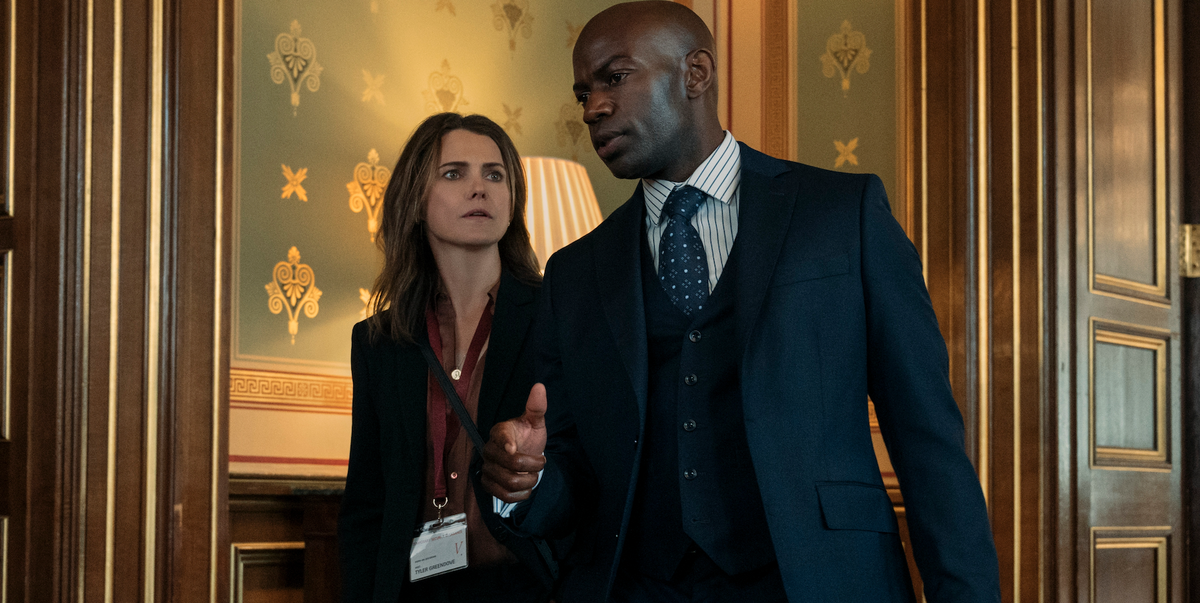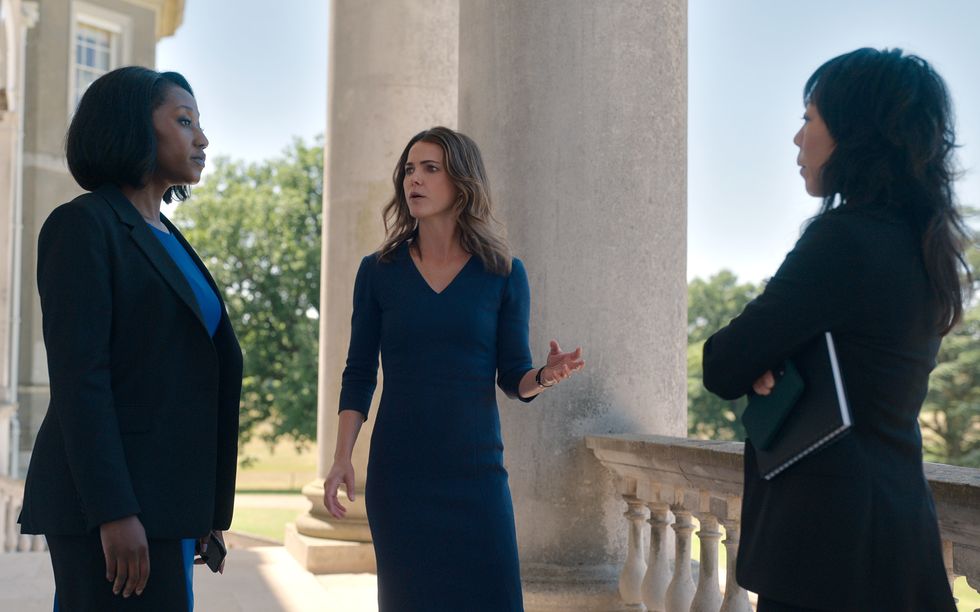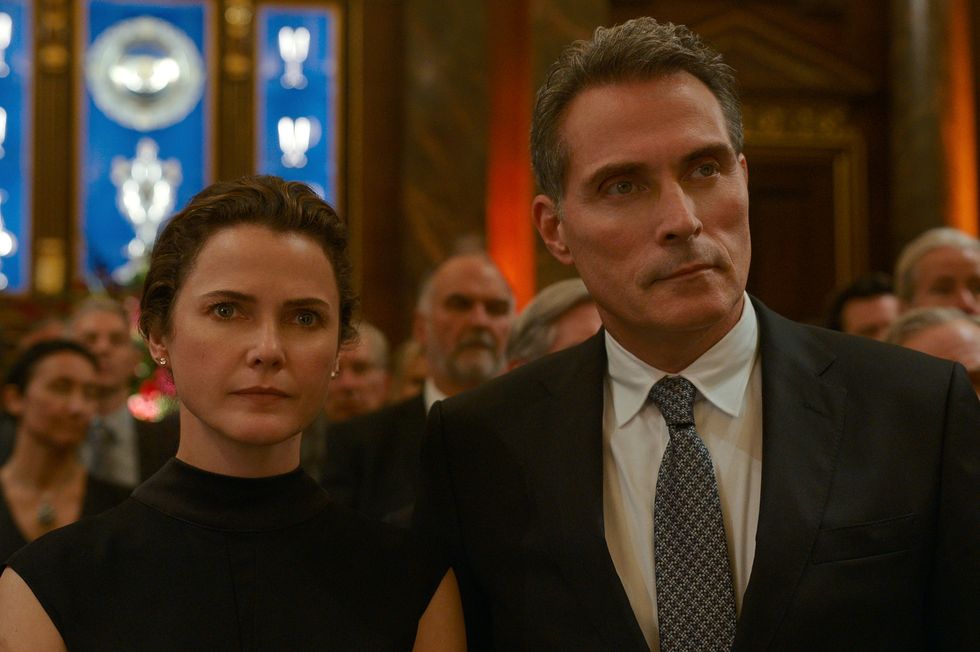The Diplomat, like the business it portrays, walks a wire. In practice, that could have created a real marketing nightmare for Netflix. The series needed to bear a passing resemblance to the real world of phone calls and paperwork it represents, but neither could its jargon be so technical as to alienate viewers, running the risk of confusing (or outright boring) them into abandoning ship. Ideally, the show would be both accurate to U.S. international relations and riveting in its depiction of them; leaning too far into either camp would sever a delicate thread.
Once viewers get acquainted with the life and times of one Kate Wyler, The Diplomat is indeed a simple enough series to follow. (Even when it isn’t, rest assured: You needn’t pick up every dropped name to grasp the gist.) But settling into the U.S. Embassy in London takes Kate a few episodes, and so too does the series use its initial hours to warm up a few muscles. The dramatic payoff is ultimately worth that early, slow investment—trust us, it gets fun—but there’s no doubt a guidebook would ease the entrance.
To that end, we’ve gathered up the most pressing questions about the newest political thriller on the block. The sections below will run you through the premise, main characters, and key terms of The Diplomat, without crossing too far into spoiler territory. Bon voyage!
What, exactly, is The Diplomat about?
The Diplomat is, of course, about an act of diplomacy: an effort to avoid war between the U.K. and Iran, which could easily become a war involving numerous other countries, including the U.S.
At the start of the series, U.S. diplomat Kate Wyler is preparing to begin her role as ambassador to Afghanistan when a British aircraft carrier, the HMS Courageous, is attacked in the Persian Gulf, off the coast of Iran. Numerous British servicemen are killed. The White House calls Kate in for a briefing, where the president and Chief of Staff inform her the trip to Kabul is off. Instead, she’ll become U.S. ambassador to the U.K., a role she very much does not want, given—as the Chief of Staff puts it—the job’s “ceremonial component.” (Translation: It’s not serious work.) But Washington needs someone in London to offer condolences on their behalf, given the importance of the U.S.-U.K. alliance, and to “stop a war before it starts.”
Turns out, Kate’s the perfect fit. She has serious suspicions that Iran was behind the deaths on the Courageous and is determined to uncover not only the motivations behind the bombing but the real culprit. She’s sure it’s the only way to avoid a tragedy spurred by faulty intelligence. (Sound familiar?) But both U.K. Prime Minister Nicol Trowbridge and the U.S. Vice President are eager to prove their mettle in the face of foreign attacks, and to win public support in the process. Their recklessness is not just toxic but catching. Iran doesn’t make sense as the aggressor, but if the U.K. were to retaliate regardless, the situation would become an all-out crisis.
Together with British Foreign Secretary Austin Dennison and her own crew of U.S. Embassy and CIA officials, Kate is tasked with managing Trowbridge’s thirst for action while juggling the secretary of state’s dissatisfaction with her and the still-unconfirmed source of the Courageous strike.
In the midst of this main conflict are two other sub-conflicts: one between Kate and her government, and one between Kate and her husband. The White House wants Kate to replace their soon-to-be-disgraced VP; Kate has no interest in the job. Kate wants a divorce from her husband, Hal; he wants to stay together. Oh, and one other issue: “The vice presidency” and “divorce” don’t tend to exist amicably in the same sentence.
Phew. Still with us?
Sure, but who are these people?
There are a large cast of characters in The Diplomat, and each of them play a role in sparking or preventing armed conflict. Some of them operate not only under multiple titles but multiple nicknames. To help you keep track, in order of appearance, there’s:
Kate Wyler (Keri Russell): A well-regarded U.S. diplomat and the new U.S. Ambassador to the U.K., diverted from her planned trip to Afghanistan in order to smooth over relations between the U.S., U.K. and Iran. Sometimes referred to as “Ambassador Wyler,” “Katherine,” “Katie,” and “Cinderella.”
Hal Wyler (Rufus Sewell): Kate’s husband and an esteemed diplomat himself. Also occasionally referred to as “Ambassador Wyler.”
Billie Appiah (Nana Mensah): The White House Chief of Staff, who envisions significant potential for Kate in Washington.
President Rayburn (Michael McKean): The sitting U.S. president. Once or twice, he’s called “President Ratburn.”
Stuart Hayford (Ato Essandoh): Deputy Chief of Mission at the U.S. Embassy in London. (That’s a fancy way of saying he’s Kate’s second-in-command.) Sometimes referred to as “DCM.”
Frances Munning (Penny Downie): Resident manager of Winfield House, the historic London home where Kate and Hal live during their time in the U.K.
Ronnie (Jess Chanliau): An assistant in the U.S. Embassy, primarily working with Stuart.
Alysse (Pearl Mackie): Also an assistant in the U.S. Embassy, primarily working with Kate.
Eidra Park (Ali Ahn): Chief of the CIA Station in London, tasked as a manager between American and British intelligence agencies.
Pensy (Georgie Henley): An assistant in Winfield House.
Austin Dennison (David Gyasi): The British Foreign Secretary, overseeing U.K. foreign relations on behalf of Prime Minister Nicol Trowbridge. Often referred to simply as “Dennison.”
Nicol Trowbridge (Rory Kinnear): The bombastic U.K. Prime Minister. Occasionally called “Nicol Trickle.”
Miguel Ganon (Miguel Sandoval): The easily irked U.S. Secretary of State. Usually referred to as “Ganon.”
Margaret Roylin (Celia Imrie): A “Tory operative” with a bad reputation but significant sway over Trowbridge.
Rasoul Shahin (Bijan Daneshmand): Deputy Minister of Foreign Affairs for Iran, and an insider source for Hal. Almost exclusively referred to as “Shahin.”
Cecilia (T’Nia Miller): Austin Dennison’s sister and a spitfire with much more influence than her detractors give her credit for.
How much of this jargon do I need to understand?
The dialogue in The Diplomat, like that of The West Wing, is fast-paced and quippy, with rarely much room for exposition or explanation. That’s fitting for an environment where employees are expected to know and speak the language of foreign relations with ease. But to a casual viewer, acronyms like GCHQ and NSC might trigger quizzical looks. If you find yourself struggling to keep up, you’ll find a list of useful terms below, arranged in alphabetical order.
Ambassador: A high-ranking official government appointee and representative in a foreign nation, in charge of a diplomatic mission. Ambassadors are all diplomats but not all diplomats are ambassadors. A good example of this is Kate and Hal: Both are diplomats, but in The Diplomat, only Kate is serving as the official ambassador to the U.K. Hal has previously served as an ambassador, thus why he is occasionally referred to as “Ambassador Wyler.”
Brexit: A catchy name for the United Kingdom’s break from the European Union, voted through during a referendum in 2016 and finalized in 2020. It’s a combination of the words “Britain” and “exit.”
CIA: The Central Intelligence Agency, the hub of foreign intelligence in the U.S.
DCM: Deputy Chief of Mission, a.k.a Stuart.
Diplomat: A U.S. government employee responsible for carrying out U.S. foreign policy abroad. These duties can include—but are certainly not limited to—negotiating peaceful relations, assisting in humanitarian efforts, advancing American commercial interests, navigating crisis situations, and evacuating refugees.
EU: The European Union, an economic and political union between 27 countries in Europe, including France, Spain, Italy, Bulgaria, Poland, Germany, Greece, Croatia, Sweden, and many others. As of 2020, the United Kingdom is no longer part of the EU, which is still a matter of tension amongst many countries (including the U.K. itself).
FBI: The Federal Bureau of Investigation, the lead U.S. national security organization and the country’s principal law enforcement agency. Unlike the CIA, which has no law enforcement duties and is focused on gathering information from foreign civilians, the FBI also collects domestic intelligence.
Foreign Office: Part of the larger Foreign, Commonwealth & Development Office (FCDO) in the U.K., the Foreign Office oversees international relations on behalf of the country.
Foreign Service: The organizing system under which U.S. diplomats operate. It’s part of the U.S. Department of State, sometimes referred to in The Diplomat simply as “State.”
GCHQ: Government Communications Headquarters, otherwise known as the U.K.’s main intelligence and security organization.
IRGC: Islamic Revolutionary Guard Corps, a branch of the Iranian Armed Forces that is deeply embedded in Iranian politics and currently designated by the U.S. as a terrorist group.
Kabul: The capital of Afghanistan, where Kate was originally meant to be traveling at the beginning of The Diplomat.
Kremlin: A fortified stronghold of the Russian government in Moscow, as well as a catch-all term for the Russian government itself. (This is similar to how many refer to “the White House” or “Washington” in reference to the U.S. government.)
MI5: An intelligence agency of the U.K., focused on domestic civilians and security.
MI6: Another intelligence agency of the U.K., focused on foreign relations and defense.
MP: Member of Parliament, a.k.a elected representatives who advocate for their district’s interests in the U.K. House of Commons.
NATO: North Atlantic Treaty Organization, a political and military alliance consisting of 31 countries in Europe and North America, including the U.S. and U.K. These countries consult one another on diplomacy and security, and they ascribe to the “principle of collective defense,” which means that an attack against any NATO member country is considered “an attack against all.”
NSA: National Security Agency, a data- and communications-focused U.S. intelligence agency under the Department of Defense, focused on security systems, surveillance, and signals intelligence. The NSA provides information to the U.S. government, including both the CIA and the FBI.
NSC: National Security Council, an advisory council to the U.S. president on matters of national security and foreign relations.
PM: Prime Minister. In The Diplomat, that’s Nicol Trowbridge.
RSO: Regional Security Office, charged with the safety of those involved in a U.S. mission to the United Nations.
Tory: Slang for a member of the British Conservative Party. The Diplomat’s Nicol Trowbridge oversees a Tory government.
UN: United Nations, a massive international organization consisting of 193 member countries, including the U.S. and U.K.
VP: Vice President of the U.S.
Is The Diplomat based on a true story?
Yes and no. The story is entirely fictional, but show creator Debora Cahn says many elements are “inspired by” reality, if “not at all faithful to” it.
The Diplomat frequently references real-life circumstances and events, such as Brexit, the ongoing war in Ukraine, U.S. commercial interests in the Middle East, the post-9/11 U.S. invasion of Iraq, and the COVID-19 pandemic. “I wasn’t looking to create a mirror image of what’s happening [now],” Cahn told ELLE.com, “but there are certain dynamics that repeat themselves and are legible from looking at our current situation, and I felt like were worth dramatizing.”
To ensure that any real-world departments, agencies, and discussions represented on screen echoed the truth, Cahn and her crew interviewed around 60 sources, including diplomats, intelligence agents, and journalists. Still others served as consultants for the show—including a retired CIA officer—who each “read every word [of the script] and they read it twice, and looked out for things that were wrong or misrepresented.”
Adds Cahn, “I wanted [the show] to feel real and sound as real as possible. Because, obviously, it’s entertainment; we’re going to turn a whole lot of it into a fairytale and a fantasy. I want that to be rooted in, What is this world really like?”
Will there be a season 2?
Sorry, but to access that information, you’ll require further clearance.
Culture Writer
Lauren Puckett-Pope is a staff culture writer at ELLE, where she primarily covers film, television and books. She was previously an associate editor at ELLE.


